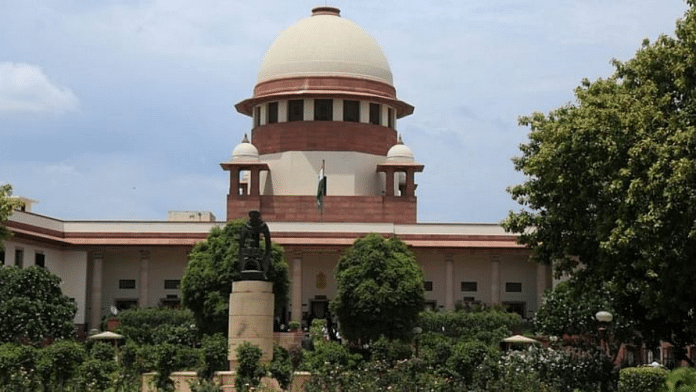New Delhi: A five-judge Constitution bench led by Chief Justice D.Y. Chandrachud will, on 11 July, take up a batch of over two dozen petitions that seek to challenge the legal validity of the Jammu and Kashmir Reorganisation Act, 2019, which divided J&K into two Union territories, and the 5 August 2019 presidential order that nullified Article 370 of the Constitution (which gave special status to the erstwhile state).
According to a notification uploaded on the official website of the SC Monday evening, the Constitution bench would pass directions on the said date. This means the bench is most likely to fix deadlines for the parties to file written submissions, if any, and to complete their arguments.
According to the notice, the bench will also comprise the top four senior-most judges after the CJI — Justices Sanjay Kishan Kaul, Sanjeev Khanna, B.R. Gavai and Surya Kant.
Monday’s notice follows multiple mentions by the petitioners asking the CJI to list the matter for hearing.
Justices Kaul, Gavai and Surya Kant were also members of the original Constitution bench that was constituted in October 2019 by the then Chief Justice Ranjan Gogoi, who had made the reference on 28 August 2019.
Justice N.V. Ramana — who retired in November 2022 as CJI — headed the bench while Justice R.S. Reddy was the fifth judge on it.
The petitions were last heard in March 2020, when the Constitution bench had declined to refer the case to a larger bench of either seven or nine judges.
The matter could not be heard due to the onset of the Covid-19 pandemic that disrupted court hearings, even though the top court continued to function in online mode.
This, SC sources said, was because of the number of petitioners in the case and the bulky documents annexed to the petitions.
“Our systems then did not permit us to allow so many lawyers to appear online in one case. Moreover, the technology in use at that time also did not support digitisation of such bulky case files,” the source quoted above told ThePrint.
Also Read: Article 370 to G20, India is in a Kashmir sweet spot. Now, tick the last boxes
Case history
The J&K Reorganisation Act, 2019, has already been acted upon. The changes came into effect on 31 October 2019 after being notified in the official gazette.
On 1 October 2020, the Constitution Bench headed by Justice Ramana had said, “The Supreme Court can always turn the clock back.”
On 2 March 2020, the same bench had declined to refer the petitions to a larger bench, as was urged by the petitioners.
The petitioners had sought reference to a larger bench on the ground that two earlier top court judgments — Sampat Prakash delivered in 1959 and Prem Nath Kaul pronounced in 1970 — contained divergent views about the status of Article 370.
However, the SC accepted the central government’s argument that there was no conflict between the two verdicts.
It was the petitioners’ contention that, in Sampat Prakash, the top court had held that Article 370 will cease to be operative only if the President issues a direction to that effect on a recommendation made by the Constituent Assembly of J&K.
In the Prem Nath Kaul verdict, the petitioners had argued, the top court opined that plenary powers of the ruler of Kashmir were not limited by Article 370. It was held in this case that the temporary provisions of Article 370 were based on the assumption that the ultimate relationship between India and J&K would be finally determined by the Constituent Assembly of Jammu & Kashmir.
However, opposing this contention, the central government had argued the two judgments were delivered on different issues and not related to each other. The sovereignty of J&K enabled by Article 370 was temporary, the central government had said.
Dismissing the petitioners’ plea, the bench said the two judgments cannot be interpreted in vacuum, separate from their facts and context. Observations made in the cases, it said, cannot be “selectively picked in order to give them a particular meaning”.
(Edited by Anumeha Saxena)
Also Read: Abrogation of Article 370 ‘death of democracy as it was done without consent of state’: Digvijaya



